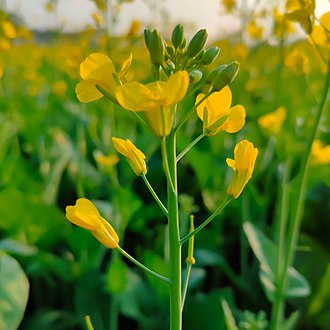As we celebrate the Eleventh Sunday of Ordinary Time 2021 Fr. Paul Gallagher, OFM offers a Scriptural Reflection. This content is edited by Franciscan Sister of Christian Charity Sister Anne Marie Lom and Joe Thiel. The excerpts from the Sunday readings are prepared by Joe Thiel. To read or download the complete pdf with excerpts for your prayer, please click here: Franciscan Gospel Reflection June 13 2021 . Excerpts are from the Lectionary for Mass for Use in the Dioceses of the United States of America, second typical edition © 2001, 1998, 1997, 1986, 1970 Confraternity of Christian Doctrine, Inc., Washington, DC. Used with permission. All rights reserved. No portion of this text may be reproduced by any means without permission in writing from the copyright owner. Images: https://commons.wikimedia.org/wiki/File:Brown_Mustard_Seed_(Close).jpg#/media/File:Brown_Mustard_Seed_(Close).jpg
Mark 4:26-34
Jesus said to the crowds, “This is how it is with the kingdom of God; it is as if a man were to scatter seed on the land and would sleep and rise night and day and the seed would sprout and grow, he knows not how. Of its own accord the land yields fruit, first the blade, then the ear, then the full grain in the ear. And when the grain is ripe, he wields the sickle at once, for the harvest has come.”
He said, “To what shall we compare the kingdom of God, or what parable can we use for it? It is like a mustard seed that, when it is sown in the ground, is the smallest of all the seeds on the earth. But once it is sown, it springs up and becomes the largest of plants and puts forth large branches, so that the birds of the sky can dwell in its shade.”
With many such parables he spoke the word to them as they were able to understand it. Without parables he did not speak to them, but to his own disciples he explained everything in private.
Background:
The gospel text for today is composed of two short parables that draw on the common experience of people of the day. Both parables reflect the experience of planting seeds, and how they develop into mature plants. While the parables may reflect a primitive understanding of how seeds develop into mature plants, they point to the sacred mystery that is unfolding in creation every day, even though this mystery is barely perceptible to most as it is unfolding.
 As Jesus tells these two parables, no mention is made of the work of weeding, fertilizing or watering. The fact that the plants grow and develop to maturity adds to the sense of mystery, and that God is present, unfolding whatever it is that God desires in the seeds that God has created, in the earth that God has created, with the rain and the sun that God has created. The plants, like the reign of God, are unfolding as God has established.
As Jesus tells these two parables, no mention is made of the work of weeding, fertilizing or watering. The fact that the plants grow and develop to maturity adds to the sense of mystery, and that God is present, unfolding whatever it is that God desires in the seeds that God has created, in the earth that God has created, with the rain and the sun that God has created. The plants, like the reign of God, are unfolding as God has established.
Agriculture was one of the places where people of Jesus’ time could be surprised by abundance. For the most part, people believed that everything that existed had already been distributed by God, and there was no more where that had come from. If a person suddenly had more of something, it was generally assumed that they had gotten it by some improper means.
Thus, the woman who finds her lost coin throws a lavish party to celebrate finding the coin. She makes her discovery public, warding off suspicion and speculations about how she got the coin. It is also much less likely that neighbors will be critical if they have enjoyed a portion of its fruit.
But farming was one of the places where the surprise of abundance might be experienced without the presumption of foul play. At the same time there was also an understanding that if one did gain more than they needed for their survival, the abundance was to be shared with those in need. This sheds light on the familiar parable of the farmer who thought he would build larger storage bins for an abundant harvest and live off his surplus for years in the future. He died enjoying neither the abundant harvest, nor the good reputation he could have had by sharing the abundance with those in need. Instead, when he died, a different reputation continued on after his death.
Reflection Questions:
- What are some areas in your personal life where you have experienced growth, diminishment, or changes that were imperceptible in your daily life?
- What are some of your favorite images or passages from scripture of the reign of God?
- What qualities do you think people who have devoted their lives to things like tending the earth, gardening, and earth conservation might share? How might those qualities affect their relationships to God and to others?
- When I think about watching a seed grow into a large bush or a tree, I am…
- Can you take some time now to talk with God about your hopes for the reign of God, the way and pace at which it seems to be unfolding, and your own willingness to let God work in God’s time?



